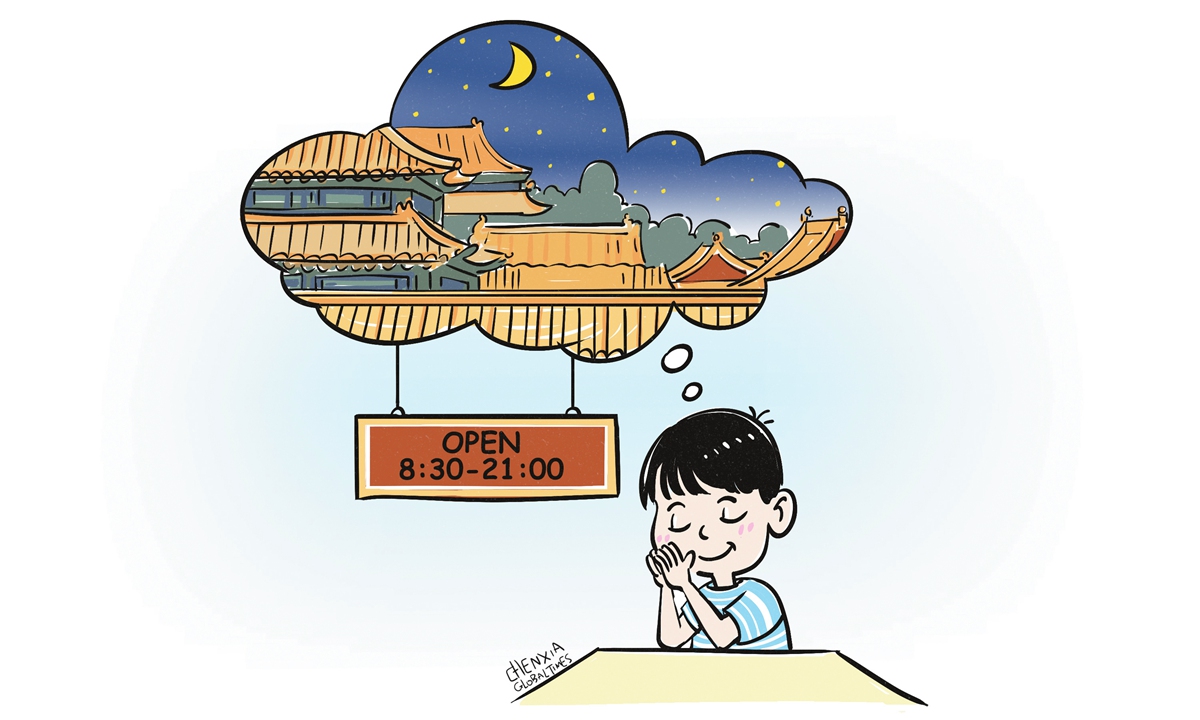"Could the Palace Museum stay open until 9 pm?" "I couldn't book any tickets for the National Museum of China during this visit to Beijing. Can the museum extend its opening hours to night?" With the growing enthusiasm among Chinese travelers for museums, some venues are having increasing difficulty in providing opportunities for everyone to enjoy their facilities, especially during the peak summer tourist season.

Illustration: Chen Xia/GT
Amid the situation, the implementation of night programs at some museums has aroused public interest. The fantasy presented on the screen in films such as the US film
Night at the Museum have spurred people's curiosity and longing to saunter around museums and appreciate their collections during the quiet hours of night.
With careful consideration and meticulous planning, nighttime museum tours can develop into a safe, engaging, and profitable model, fostering a win-win situation for both tourists and institutions.
In contrast to wandering around night fairs and relishing midnight snacks, night tours at museums can cater to people's spiritual needs and promote the concept of enjoying traditional culture during one's leisure time. Meanwhile, the longer opening hours at museums can also stimulate the night economy by boosting the prosperity of surrounding businesses such as hotels, restaurants and transportation.
Chinese museums received 1.29 billion visitors in 2023, a record high, according to official data. Actually, many museums around China have been trying to deal with an overload of visitors, leading to a shortage of tickets.
Some popular venues such as the Palace Museum and the National Museum in Beijing have even had to shut their gates upon many tourists, even those who began scrambling for tickets a few days in advance.
The huge number of visitors and booming demand has been a point of exploitation by ticket scalpers, who scramble to buy up tickets using special software and then resell the tickets at a much higher price.
Chinese authorities have introduced various policies to address the problem, such as releasing the Notice on Strengthening Museum Services during Summer Vacation and Festivals. Many museums across the country have also adopted their own measures to optimize their services.
Extending opening hours is also one of the effective ways to deal with the dilemma. If more popular museums and attractions carry out additional evening tours, they can effectively manage daytime visitor traffic while also enhancing people's evening experience.
A variety of museums around the country have been exploring the possibilities that night hours bring.
Organized by the Shanghai Municipal Administration of Culture and Tourism, the event called Museum Night was launched in the city.
An array of special activities has also been organized across various museums throughout the city, including fossil excavations at the Shanghai Natural History Museum and nighttime sky observations at the Shanghai Astronomy Museum.
A total of 45 museums across 14 districts in the city are participating in the initiative on weekend evenings throughout the summer.
Building on the successes of previous years, these museums offer visitors an even more captivating and stimulating experience by seamlessly blending elements of culture, history, art, and innovation to create an enchanting "Museum Night" series in Shanghai.
Located in Hangzhou, the Zhejiang Museum of Natural History has transformed a 310-square-meter room into a 24-hour cultural space. The venue has proven so popular that the museum has had to limit entry to 100 people per hour in order to maintain the quality of the experience.
In Beijing, the Art Museum of the Central Academy of Fine Arts buzzed with joy, laughter, and delightful surprises on a lively Saturday night. Families, including many young children and their parents, eagerly explored the annual exhibition of works by graduating artists.
This showcase not only celebrates the accomplishments of the academy's newest graduates, but also allows them to share their creativity with the wider community.
As for the Palace Museum, which has seen the most calls for night hours, it actually opened at night one time in 2019, which was greatly extolled by the public. At that time, about 3,000 visitors were allowed to visit the Gate of Supreme Harmony and step onto the outer city walls of the museum to enjoy a night tour, which had been graced by 350 pairs of red lanterns during the Lantern Festival earlier that year.
In early July, the National Cultural Heritage Administration responded to the pressing needs of tourists by recommending that popular spots extend their opening hours during the summer based on demand.
Recently, the third batch of national-level night-time cultural and tourism hubs were announced, bringing the total to 345 across the country.
The growing enthusiasm for cultural and historical sites can improve the public's cultural confidence and also benefit the inheritance of traditional Chinese culture, which should not be held back by obstacles such as a lack of tickets.
Most museums operate as public service organizations offering free admission, so extending their opening hours is likely to increase their workload. This necessitates a thorough consideration of various factors, including staff incentives, operating costs, and management challenges.
Given the nature of summer students' travel, it is especially important to enhance safety management for exhibits, effectively manage visitor flow, and develop comprehensive emergency plans.
The author is a reporter with the Global Times.
life@globaltimes.com.cn




